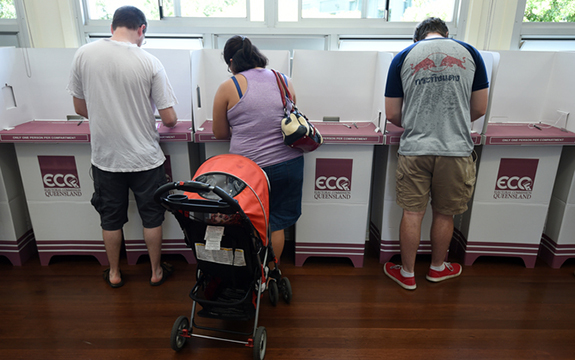Why more and more Australians are voting before election day

In Summary
By Nathaniel Reader, Swinburne University of Technology
As counting for the Queensland state election continues, the Electoral Commission of Queensland has reported a record number of pre-poll votes. More than 200,000 Queenslanders cast their vote early. This result once again confirms early voting as the fastest-growing trend in Australian electoral participation.
Australians have been voting early in one form or another since the start of the 20th century, when postal voting was introduced for the first federal elections. But the recent, growing popularity of early voting in person is a newer phenomenon.
The statistics are remarkable. At the 2013 federal election, 2.5 million Australians voted before election day – an increase of one million from the 2010 numbers.
Among the states and territories, the ACT and Victoria have the highest rate of pre-poll voting. At the 2014 Victorian state election, 25% of Victorians voted early in person. In some electorates, such as then-premier Denis Napthine’s electorate of South-West Coast, around 50% voted before election day.
What's behind the change?
Australia’s electoral commissioners think the answer is convenience, driven by social changes. At face value, this is hard to disagree with.
Consider how different the Australian electorate of 2015 is to the electorate of 1924, when compulsory voting was first introduced. One in three now work on weekends. Overseas and interstate holiday travel is the norm – how many Queenslanders took holidays in January? People are also simply “busier” and less inclined to give up their leisure time to vote.
If recent trends hold, early voting in Australia is here to stay. AAP/Dan Peled
As research commissioned by the Australian Electoral Commission notes, people expect to engage with government on their own terms. This includes elections.
Nevertheless, the growth in pre-polling also owes something to Australia’s patchwork electoral legislation. While clear rules govern postal voting for federal and state elections, there is less prescription around pre-poll voting. For example, pre-poll voting has increased dramatically in Victoria since 2002, just after legislative changes stipulating that attendance at a pre-poll centre is deemed to constitute a declaration. Prior to 2002, electors had to declare in writing that they were unable to vote on election day.
In this context, it is easy to appreciate why an electoral commission might want to increase access to early voting services. They would rather deal with a flurry of early votes than long queues of disgruntled voters.
Lengthening the electoral timetable has several ramifications, though. In an administrative sense, increased rates of early voting have prompted calls from major political parties and some electoral commentators for electoral commissions to start counting early votes on election night amid concerns about delayed election results.
Early voting and democracy
There is also the developing issue of how early voting affects campaigning. While major parties are relatively well-resourced and capable of sending volunteers to hand out how-to-vote cards at early voting centres, minor parties are finding it tough to compete.
These concerns lie at the heart of a legal challenge by Maria Rigoni, the Palmer United Party candidate for the Northern Metropolitan Region in the 2014 Victorian state election. Rigoni has lodged a petition in the Supreme Court alleging that the Victorian Electoral Commission breached electoral legislation by allowing people to vote before election day without signing a pre-poll declaration. In reality, only postal voters need to apply formally for an early vote.
While the Rigoni case is unlikely to result in a new election, larger issues are at play here, as hinted by the presiding judge Jack Forrest. If one type of political participant is disadvantaged by the move to flexible voting services, is early voting as essential as it is elsewhere – such as in the US, where voting is not compulsory and convenience voting is an essential component of getting out the vote?
More broadly, with one in three electors voting before election day, what is the impact of this trend on the civic norms that traditionally underpinned the Australian electoral experience? One of the key tenets of democratic theory is that citizens should, as much as possible, vote at the same time. Doing so confers equality on the contest. If some people vote ten days out before the election, there is always the chance they may miss a major campaign announcement.
Or are people simply making an informed choice to participate at a time that suits them? Is this then an instance of citizens reclaiming something from political parties, who tightly control the rules governing elections?
Either way, as the federal parliamentary committee on electoral matters found in 2014, early voting is here to stay.
![]()
This article was originally published on The Conversation. Read the original article.

